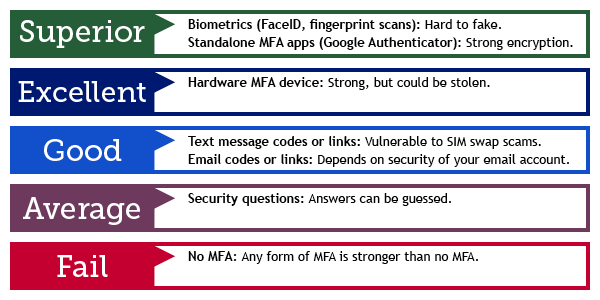Every October, Cybersecurity Awareness Month reminds us that staying safe online is just as important as locking our doors at night. With so much of our daily life—from banking and shopping to school and work—happening in the digital space, protecting ourselves has never been more critical.
Read the Governor's Proclamation
This year, the spotlight is on the “Core 4” cybersecurity practices—proactive steps anyone can take to strengthen their digital defenses and keep personal and professional information secure.
Think Before You Click
The best defense against cyber scams is to be cautious. If something feels off, don’t click—report it. Remember, just opening an email is safe; it’s the links and attachments that can put you at risk.
Phishing emails are one of the most common tricks cybercriminals use to steal sensitive information like passwords, credit card numbers or personal data. These messages are crafted to look real, but if you know what to look for, the red flags are easy to spot:
- Urgency and Pressure – “Your account will be locked!” or “Immediate action required.”
- Suspicious Sender – Check the email address carefully for odd domains.
- Typos and Bad Grammar – Legitimate companies rarely make repeated mistakes.
- Unexpected Attachments or Links – These often hide malware.
- Inconsistent Branding – Distorted logos or design flaws can give a fake away.
- Lookalike URLs – For example, gov-co.org instead of gov.co.
Stay alert, stay skeptical and protect yourself before you click.
Stronger Passwords Start with Passphrases
Not all accounts are created equal—your banking, investment and email logins deserve the strongest protection. That’s why it’s important to use unique passphrases for your most important accounts. If one site gets hacked, the rest of your accounts stay safe.
Passphrases are easier to remember than random strings of characters, but far harder for attackers to crack because of their length. Think of them as a personal sentence only you would know.
Tips for creating strong passphrases:
- Don’t reuse the same passphrase across accounts.
- Skip personal info like birthdays, names or addresses.
Make it unique and memorable, but tough for others to guess.
Example: happyPuppies&slobberyWalksAretheBest!
Your best defense? A passphrase that only makes sense to you.
Lock Down Your Logins with MFA
Think of your password as the front door key to your digital life. Now imagine adding a deadbolt—that’s what Multi-Factor Authentication (MFA) does. It gives you an extra layer of security so even if someone steals your password, they still can’t get in.
MFA works by asking for two or more ways to prove that it’s really you, such as:
- Something you know – your password or PIN
- Something you have – your phone, a security token or a code sent by text/app
- Something you are – your fingerprint, face or voice
With MFA, cybercriminals can’t break in with just one stolen key—they’d need them all.

Updates = Protection
One of the most proactive and powerful ways to protect your devices is to keep your software up to date. Updates aren’t just about cool new features—they patch the security holes that hackers are constantly trying to exploit.
When you do system updates, you:
- Shut the door on attackers by closing security gaps
- Keep your systems running smoothly and reliably
- Protect sensitive information
Waiting too long leaves the door wide open for malware, ransomware and data breaches. And don’t forget: updates aren’t complete until you restart your device. Hit “restart” right away to lock in your protection.
Staying safe online doesn’t have to be complicated. By weaving just four smart habits into your daily routine, you can take control of your digital safety—and help protect your personal information, devices and your entire community.
